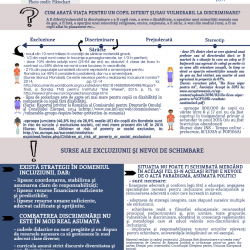Education without Discrimination - A Problem of the Whole Society
In the past years there has been a lot of discussion about the role that intercultural education has in the formation of students’ personality. And rightly so. The values of education without discrimination are, almost entirely, moral values. And we cannot talk about education without this axiological dimension of our personality. Perhaps the most appropriate definition of education in this context is that given by Kant: “man’s path to humanity”. But education is not carried on only in a formal context, in education institutions, but also at home or in other informal or non-formal contexts. Perhaps more than any other component of education, intercultural education must be encouraged by family. Or, better said, family is where it begins or it should begin. Most of the times, children go to kindergartens and schools having already formed stereotypes. From a small age, they hear from their parents expressions such as: “if you do not behave I will give you to the gypsies”, “you smell like a gypsy!”, “you talk as if you were at a tent’s door” etc. We referred only to the Roma ethnicity because, unfortunately, they are the most condemned to stereotypes. But there are other ethnicities (depending on the part of the country), not to mention religious and sexual stereotypes and prejudices. In these cases, parents are very vocal in supporting denigrating beliefs, blameworthy for anyone who is different than them.
As much as we would like it, school cannot replace everything. Today, everything related to education is left on school’s “shoulders”. We don’t think that an optional course called “Intercultural Education” (at it has been proposed repeatedly!) solves too much. It would just be yet another class in which very difficult concepts related to this field are taught, and the evaluation would consist of a short-term memory verification. Just like in the case of moral education, we are talking about forming a moral conscience that can be justified only in the presence of moral conduct. You cannot limit education without discrimination to a purely theoretical level. School offers daily contexts in which this type of education must be valued: from topics in the curricula, to various subjects, to concrete situations that students are involved in outside of class. And we believe that those that have the most powerful formative effect are the ones in which they effectively participate, showing the personal conduct of a young person educated in an intercultural manner. But, for this, we must have teachers who are prepared to be true trainers in this field, who will promote values and social behaviors such as acceptance, tolerance, communication and positive integration and will avoid negative attitudes of labeling, stereotypes, prejudice and discriminatory behavior, intolerance, xenophobia, racism, etc. In our opinion, it is the first concern that we should have: the teachers’ initial training. Intercultural education is only an optional course in the national curricula for those who take on the pedagogical forming program, but it is taught by most universities. But you do not become a trainer only by going through a course and taking an exam. It’s just one of the components that forms the teaching style, along with personal beliefs and experiences. For this reason, we believe that apart from mastering a theoretical baggage, students must be involved in activities other than teaching: national and international projects, participation in community activities, involvement in volunteering etc. In this way, they will be teachers who will, in their turn, involve the students from the schools where they work.
Even if the curricula for some courses (humanist ones) makes references - in their transmission of values and attitudes chapter - to expressing interest for intercultural communication, interaction between national and European cultural identity, examples of learning activities or explicit content on this are not given. But each discipline provides contexts (through certain subjects) for its highlighting and promotion; what is important though is for the teacher to be capable, available and prepared in this regard. The teacher must be convinced that it is a requirement of our society to develop students’ interest towards intercultural issues, to develop an attitude of cultural and intercultural empathy, leading thus to understanding otherness and refusing discrimination. On the other hand, the teacher must be a genuine cultural mediator, who knows his students, who encourages knowledge and knowing each other within a group, who does not discriminate a student of a certain ethnicity by sitting him in the last seat or isolating him from the rest, who communicates assertively and is capable of positively resolving any conflict, who promotes cultural identity, etc.
Through the nature of our job, we are involved in the initial training of university teachers, both undergraduate and master, but our activity also takes into account their continuous training. In recent years we understood how important the role of non-formal education is in shaping a young person, so we also work with the TopFormalis Association, where through various activities we aim to provide teachers with contexts in which to improve professionally. And education for diversity plays an essential role, especially taking into consideration the proposals for activities in the “School in a different way” week. It could be a favorable context for students to be truly involved in activities that promote education for diversity, especially because we live in an area with a lot of multi-ethnic schools. We built our experience in this matter thanks to international projects in which we were involved, one of them regarding multi-ethnic education in schools in the border region, a project in partnership with the University of Debrecen, Hungary. We had the opportunity to conduct our activities with students in schools in Romania and Hungary and we were able to see the good parts, but also the shortcomings in both countries. We believe that a positive aspect in some schools in Romania is the presence of a school mediator, paid by the local community, who supports education without discrimination a lot. Intercultural activities, involving the whole community – students and sometimes their parents, are beneficial.
What we want to emphasize is that education without discrimination must be a joint effort: of the school, of the family, of the local community. There are families who don’t know or can’t accept having a homosexual child, families who can’t accept that their neighbor is of a different religion and judge him, or that he is of a different ethnicity and condemn him. This type of education starts early, in the family, and lasts a whole life. Forming a healthy system of values, in which the respect and promotion of human rights are an internal resort, is a joint effort. There is a need for permanent learning, self-awareness and knowing each other if we want to form an open attitude towards diversity. But first you have to realize these things and to want to. Only then can you be called HUMAN.
Adela Bradea, associate professor at the University of Oradea,Teaching Staff Training Department . Courses Leader: Foundations of Pedagogy, Intercultural Education, Classroom Management. Expert member in several international projects: Collaboration for Equality of Chances in Multiethnic Cross-border Education, Teaching and Learning in Special Education with Information Communication Technologies etc.
Valentin Cosmin Blândul, professor doctor at the University of Oradea,Teaching Staff Training Department . Courses Leader: Foundations of Pedagogy, Education’s Psychology, Theory and Methodology of Training. Theory and Methodology of Assessment, Classroom Management. Member of several international projects, President of the Asociation for Education „TopFormalis” in Oradea.
Email – adelabradea@yahoo.com, bvali73@yahoo.com













